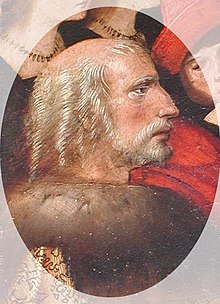
Back نظريات أصل كريستوفر كولومبوس Arabic Origen de Cristòfor Colom Catalan نظریات منشأ کریستوف کلمب Persian Théories sur l'origine de Christophe Colomb French Origini di Cristoforo Colombo Italian Teorias sobre a origem de Cristóvão Colombo Portuguese

The ethnic or national origin of explorer Christopher Columbus (1450 or 1451 – 1506) has been a source of speculation since the 19th century.[1] The consensus among historians is that Columbus's family was from the coastal region of Liguria, that he was born and spent his boyhood and early youth in the Republic of Genoa, in Genoa, in Vico Diritto, and that he subsequently lived in Savona, where his father Domenico moved in 1470. Much evidence derives from documents concerning Columbus's immediate family connections in Genoa and opinions voiced by contemporaries on his Genoese origins, which few dispute.
Other hypotheses exist, none of which are broadly accepted. Reviewing them, British historian Felipe Fernández-Armesto writes:[2]
The Catalan, French, Galician, Greek, Ibizan, Jewish, Majorcan, Scottish, and other Columbuses concocted by historical fantasists are agenda-driven creations, usually inspired by a desire to arrogate a supposed or confected hero to the cause of a particular nation or historic community – or, more often than not, to some immigrant group striving to establish a special place of esteem in the United States. The evidence of Columbus's origins in Genoa is overwhelming: almost no other figure of his class or designation has left so clear a paper trail in the archives.
- ^ (in French) Heers, Jacques. "Christophe Colomb." Hachette, 1981. pp. 21–23
- ^ Fernandez-Armesto, Felipe. 1492. The Year the World Began. Orion Press Inc., 2009. Retrieved 2015-04-16.